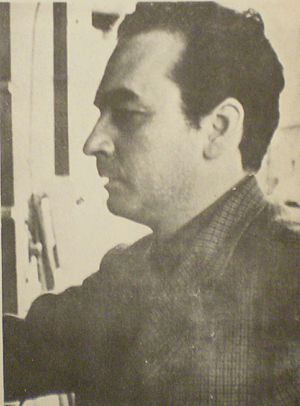Roberto Cossa facts for kids
Quick facts for kids
Roberto M. Cossa
|
|
|---|---|
 |
|
| Born | 30 November 1934 |
| Died | 6 June 2024 (aged 89) |
| Occupation | Playwright, theatre director |
| Known for |
|
Roberto M. Cossa (born November 30, 1934 – died June 6, 2024) was a very important writer and director for the theatre in Argentina. He wrote many plays that were enjoyed by many people. Some of his plays were even made into movies!
Contents
Roberto Cossa's Life and Work
Roberto Cossa grew up in Buenos Aires, Argentina. When he was 17, he started acting in plays. In 1957, he and his friends started their own theatre group called the San Isidro Independent Theatre.
Early Plays and Success
Cossa wrote his first play, Nuestro fín de semana (which means "Our Weekend"), in 1964. This play was very realistic, showing everyday life. It won him many awards in Argentina.
Between 1971 and 1976, Cossa wrote for big newspapers in Argentina. He usually avoided talking directly about politics in his plays. However, one play, El avión negro ("The Black Plane"), was about a famous leader who tried to return to Argentina in 1964.
La nona and Its Impact
After a quiet period, Cossa wrote his most famous play, La nona ("Grandma"), in 1977. This play was a bit funny and a bit sad. It was about a 100-year-old Italian-Argentine grandmother who had memory problems and a huge appetite. She caused a lot of trouble for her working-class family.
La nona is still performed today in Buenos Aires and other places. It was so popular that it was made into a movie in 1979.
Theatre for Freedom: Teatro Abierto
In the early 1980s, Argentina was under a government that limited people's freedoms. A playwright named Osvaldo Dragún decided to start a movement called Teatro Abierto ("Open Theatre"). He asked Roberto Cossa and other writers to join him. Many important thinkers also supported them.
They fixed up an old factory in Buenos Aires and turned it into a theatre. Their first festival opened on July 28, 1981. Cossa's play Gris de ausencia ("Pale of Absence") was part of the show. Sadly, during a performance on August 6, someone set off fire bombs in the theatre. This forced the Open Theatre group to move to a new place. The original theatre, Picadero, reopened in 2001.
Plays Becoming Movies
Because La nona was a successful movie, Cossa also wrote screenplays for two of his other plays in 1983. These were El arreglo ("The Deal") and No habrá más penas ni olvido ("Dirty Little War"). Both movies talked about problems like corruption and revenge in Argentine society.
After Argentina had democratic elections in 1983, Cossa wrote even more plays. Some of these included:
- Ya nadie recuerda a Frederic Chopin ("No One Remembers F.C."), which was about the difficulties of being away from home.
- De pies y manos ("On Hands and Feet"), which showed how the strict government affected one family.
- Los compadritos ("The Poseurs"), a play about events around the sinking of a German warship in 1939.
Yepeto and Later Achievements
In 1987, Cossa wrote Yepeto ("Gepetto"), which became his most successful play since La nona. This play was about an older drama professor who found himself in a complicated situation with two students. He was very interested in a young woman and felt he needed to help a young man, even though he felt jealous of the young man's carefree attitude.
Yepeto was a big hit in Argentine theatres. It was performed about 5,000 times in the 1990s before it was made into a movie in 1999.
Roberto Cossa received many awards for his work, including the National Theatre Prize in Argentina. In 2007, he became the President of the General Society of Argentine Authors, which is a big honor for writers.
Images for kids
See also
 In Spanish: Roberto Cossa para niños
In Spanish: Roberto Cossa para niños
 | James B. Knighten |
 | Azellia White |
 | Willa Brown |


